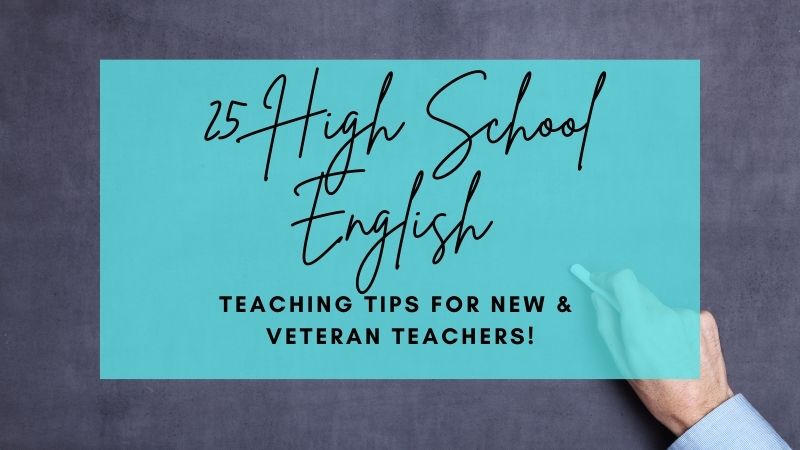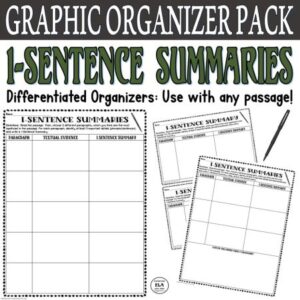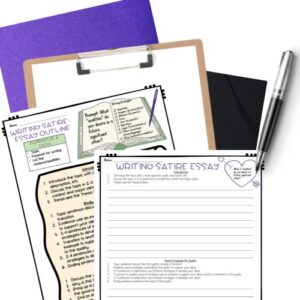There are so many reasons people become teachers. Some of the most common I know of include people wanting to make a difference or share their passion for a certain subject. During your teacher training, do you remember being asked (probably repeatedly) why you wanted to go into High School English Teaching?
I became a teacher because I love working with kids big and small. When I was in high school, I became a basketball coach for elementary kids at my church. In college, I started tutoring and worked with middle schoolers in a youth group.
Later on, I definitely realized I preferred working with high school students, particularly 9th and 11th graders!
Remembering your ‘why’ is sometimes easier said than done! Whether you’re new to teaching high school English or you’ve been doing it for a few years, you’re probably already familiar with some of the difficulties or struggles with teaching English. But, I’m hopeful you’re also really familiar with the achievements and successes that come with being a high school English teacher!
Through my 17+ years as a teacher, I’ve shifted from trepidation to triumph (and back again!), but through it all, I’ve gained some knowledge!
Read on for 25 tips for high school English teaching that can enrich and reinvigorate your teaching practice!
Need help with Test Prep as a part of High School English Teaching? Check out this FREE Pack of 3 Test Prep Activities to help students achieve success on standardized tests!
25 Tips for High School English Teaching
#1. Be over-prepared.
You can never have too many activities ready to go for class. Having more ALWAYS helps when something isn’t going as planned since it means you can pull something from your back pocket to help you pivot. Plus, it can be hit-or-miss with how long an activity might take.
I know I have lessons that I’d thought would take a full class only to have students race through it in 30 minutes. This left me scrambling! Being over-prepared means that if your initial lesson takes longer, then you already have another class planned with the ‘leftover’ activities.
#2. Plan with the end in mind.
Backward planning from the final assignment all the way to the first activity/lesson ensures you are on track. A complete plan can limit your scrambling for what’s next or what skills need to be addressed in order to complete a unit’s final task.
#3. Use thematic units when you can.
Teaching by theme can add depth and dimension to lessons. Using activities like these for short stories and poetry organized around the concept of revenge can engage students and provide variety in possible texts and extend opportunities for analysis.
See ideas by clicking below!
#4. Make connections between what you read and teach from topic to topic or text to text.
Making topics relevant for students means they’ll likely be more engaged. Consider horror stories such as Poe’s “The Masque of the Red Death” that can connect with pandemic life. A connection could be a nonfiction text with a shared central idea in different works of fiction such as these 5 easy-to-teach no prep lessons.
#5. Focus on relationships, but do so through activities that mean something and have value in the High School English Teaching classroom.
Setting goals at different times of the school year can help establish a guide for student learning, and it will also help teachers better understand their students. Check out these activities to make goal-setting simple for you and your students.
#6. Choose good literature.
This includes higher-level texts in terms of language, topics, and themes. Check out this ultimate bundle of short stories and activities as a solution to finding good literature and saving yourself hours of planning time!
Discover 13 Must-Read Short Stories for 9th Graders by clicking below!
#7. Vary assignments!
We all like different spices in life, and so do our students. Keep things fresh for everyone with different graphic organizers that help with citing evidence, writing activities for paragraphs or essays, completing visualization exercises, and more. Simply varying your assignments will help with High School English Teaching!
#8. Differentiate but don’t get crazy… keep it simple!
A teacher could spend hours and hours on a single lesson just in an attempt to include differentiated options.
Here are 5 EASY ways to differentiate for your students in High School English Teaching:
- Shorten the activity requirements. If all students are writing a paragraph with 7+ sentences, maybe some students will write 2-3 sentences.
- Assign fewer questions. If you have a quiz with 10 questions, only give 7, 5, or 3 to your students that need additional support.
- Provide a simplified version of a reading passage. There are many options available online.
- Read aloud a passage with a small group of students while others work independently.
- Give students options for reading, writing, and projects.
This pack of graphic organizers for writing one-sentence summaries is just one tool to help with differentiation in high school English teaching!
#9. Teach writing step by step.
Students need an outline as a guide. Use this Rhetorical Analysis Essay Writing Pack to help students who need assistance with creating thesis statements, outlining essays, examining nonfiction texts, and analyzing rhetorical appeals.
The bonus of the pack is that it can be used with any text saving you time and energy!
Need some help with High School English teaching? Read about THEMATIC STATEMENTS below!
#10. Model what you want your students to do for High School English teaching.
Use the I do, We do, You do approach for your lessons. Show; don’t just tell how a skill is put into practice. Then have students work together (with or without you) before tackling the skill individually. This process will give much-needed input to ensure understanding!
#11. Read aloud to your students, even 11th and 12th graders.
Consider the rise in the number and popularity of podcasts as proof that everyone loves having a story read to them!
I also enjoy listening to audible books, and so do our students. You can focus on what you hear, and this type of activity might help your students analyze more effectively!
#12. Reteach, reteach, reteach! High School English Teaching requires it!
You might think that you have done that lesson before but make it fresh and teach it again. Using formative assessments during reteaching can help you figure out who needs extra support; reteaching can add depth and assist those who may have ‘got it’ the first time!
#13. Grade in class!
You can wander the room and check in with students to be able to provide immediate feedback. Plus, we all know that no one is more hopeful than an English teacher who brings home grading, only to lug that same bag–untouched–back to school!
#14. Check work, but don’t grade everything in High School English Teaching classrooms.
Really! Students need repeated practice, but they don’t always need the teacher to weigh in on this practice. Consider the use of peer review and self-assessments as another opportunity for learning!
#15. Offer specific feedback.
Feedback can focus on 1-3 areas of improvement, but do NOT mark up an entire essay sentence by sentence. This tip is a reminder that English teachers are not meant to be editors; instead, use your time wisely to offer targeted feedback for improvement. You want feedback students can apply to future assignments. When you’re able, use (well-designed) rubrics to streamline grading!

#16. Upload assignments online ahead of time.
Digital helps! Your learning management system (LMS) probably lets you add a draft of work online and then assign it when necessary. For example, this set of activities for Edgar Allan Poe’s short story “The Masque of the Red Death” can be added in its parts to your LMS and then rolled out to students when needed. This will save you time!
#17. Set a firm deadline for assignments.
This foundation will provide you with a strong guide for all classes and can help students stay on task.
#18. Vary your deadlines between your High School English Teaching classes.
You don’t want ALL of the essays for 180 (or more) students to arrive at the same time! To go with those firm deadlines, make sure there are staggered deadlines, too!
#19. Teach grammar! It is a High School English Teaching class after all…
Too often grammar is not taught, and this can be detrimental to the development of students’ writing. What has helped me most are lessons about compound, complex, and compound-complex sentences. Integrating these lessons into a planned curriculum rather than teaching it in isolation has been a huge help for my students.

#20. Scaffold using higher level texts.
You do not teach to the lowest reading or writing level of your students. You can always read with and differentiate for your struggling learners. For example, this bundle for “A Modest Proposal” and this bundle of satirical writing activities can be done with students at all levels. Preparation by scaffolding skills is the key to differentiation and ultimately success!
LAST 5 HIGH SCHOOL ENGLISH TEACHING TIPS!
#21. Teach what you would want your own child to learn.
Consider what is needed to prepare students to have the opportunity to go to college if she/he so desires. Students are capable of achieving highly with teacher guidance and support.
#22. Don’t assume students know something!
It’s easy to think, well, of course, they learned that in elementary or middle school, but that’s not always the case. Plus, reteaching how to capitalize certain words, how to write an introduction, how to cite a source, how to avoid plagiarism, how to annotate, etc. will actually save you from unnecessary headaches! Teaching it first is better than having to backtrack in a lesson once you realize your class needs a refresher!
#23. Make directions visible.
Write the directions where students can see them, read them aloud, and give time for questions. If students ask what to do, simply point to the directions.
#24. Use time effectively as an English Teacher. We only have our students for 1 year!
Don’t waste a day watching movies unless you have a purpose in connection to the standards… Pop culture absolutely has a place in English classes, but it must have a purpose! These activities to analyze film techniques as a way to establish purpose can apply to any film and incorporate a variety of curriculum standards.
Want to teach the reading standards by analyzing themes, characterization, and techniques in movies? Click below for these High School English Teaching ideas!
#25. Check-in; don’t just check out!
If you’re struggling with high school English teaching content, grading all of the things, or managing a difficult class, make sure to check in with others. This check-in might be with another teacher in the building, your department head, or even taking a day with yourself. Rest is rarely a bad idea even if it means doing a bit more prep to have a sub cover your class!
Add to your High School English Teaching Toolbox
Whether you’re new to the profession or you’re a seasoned high school English teacher, there’s always a teacher tip or two you can add or revisit in your teacher toolbox. I’m hopeful this list of 25 high school English teaching ideas can help you and your students in the months and years ahead!
Need more fun lessons and activities that incorporate good literature for High School English Teaching? Check out my store Kristin Menke-Integrated ELA Test Prep!










